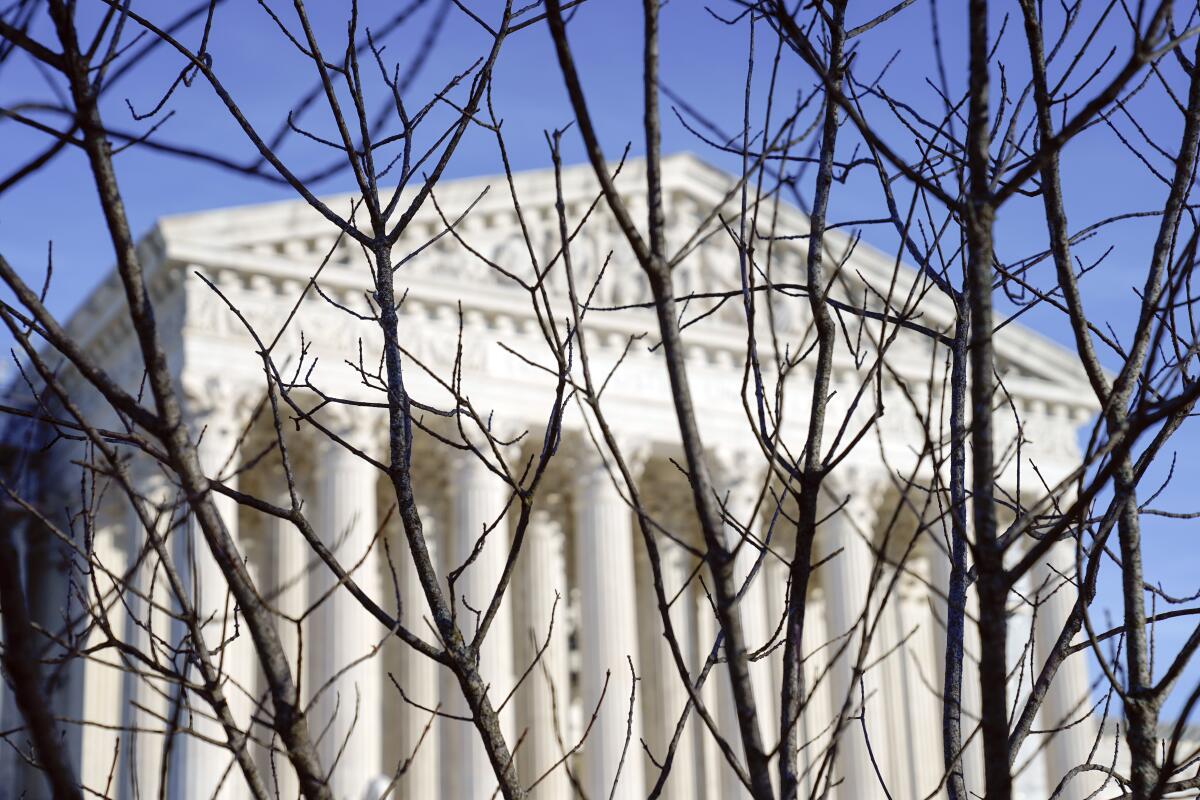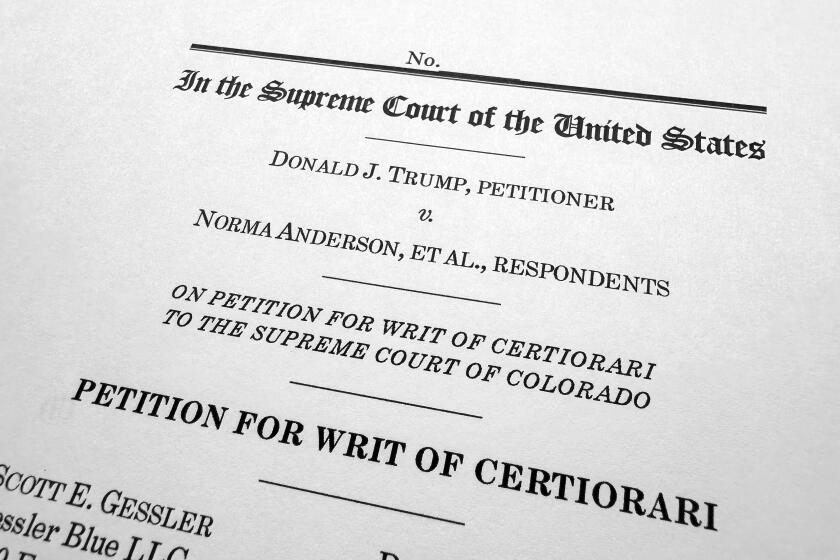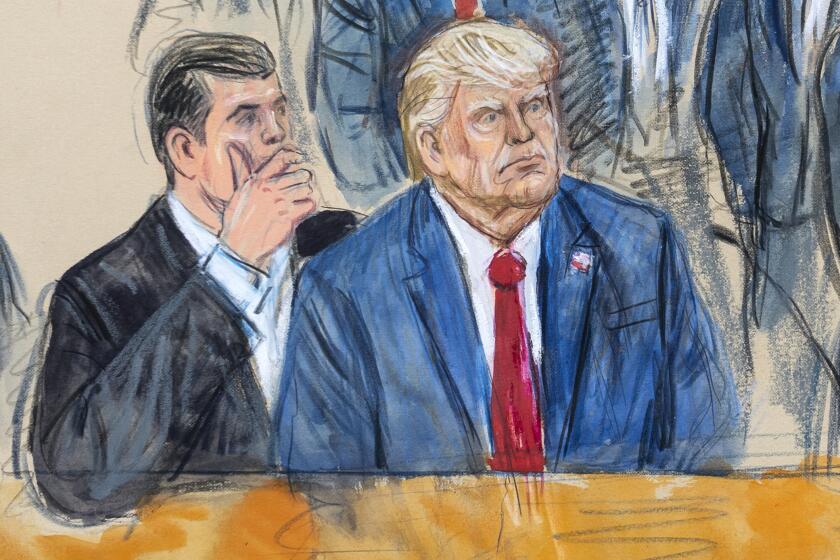The Supreme Court has 6 options for keeping Trump on the ballot. All of them are flawed

- Share via
I recently surmised that in considering former President Trump’s eligibility to run for office under the 14th Amendment, the U.S. Supreme Court will seek a national solution that applies to all 50 states. That dictates a reversal of the Colorado Supreme Court’s disqualification of Trump for engaging in insurrection, on grounds that preclude other states from following suit.
This case is among the rare instances in which the court probably should factor broad social and political issues into its opinion. And Chief Justice John G. Roberts Jr. will be looking for a rationale that can command the greatest possible consensus and minimize the fallout from a divided decision.
So what are the court’s options for overturning Colorado? I count six possible grounds, each of them flawed to one degree or another.
Column: Why the Supreme Court will probably put Trump back on the ballot in Colorado and nationwide
The former president’s disqualification for insurrection under the 14th Amendment in Colorado threatens to make a mess the justices will likely try to avoid.
Trump did not engage in insurrection: The court could differ with the Colorado court on this point in two ways.
First, it could find that Trump’s role in the events of Jan. 6, 2021, did not constitute incitement of imminent lawlessness and was therefore protected by the 1st Amendment. Trump argues that his “only explicit instructions called for protesting ‘peacefully and patriotically’” and other bland encouragements. But it’s virtually inconceivable to me that the court would side with Trump on this dubious characterization of events in the absence of a developed factual record.
Alternatively, the court could agree with Trump’s argument that the definition of “insurrection” under the 14th Amendment should be limited to a conflict such as the Civil War, in keeping with the provision’s historical context. By contrast, Jan. 6 was just a political protest that “turned violent,” his lawyers argue.
Adopting this line would drastically narrow the reach of Section 3 of the amendment, leaving it close to a constitutional nullity. Further, it would contradict not just the Colorado courts’ persuasive analysis but also historical practice. The courts and Congress have disqualified federal officials based on much less, among them Victor Berger, whom Congress refused to seat based on his socialist and anti-World War I views.
An amicus brief from the group American Oversight argues persuasively that the former president’s immunity claim doesn’t qualify for immediate appeal.
The justices lack sufficient standards for applying the amendment: Trump’s lead argument is that without a statute passed by Congress to provide guidance on Section 3 of the 14th Amendment, “courts lack judicially manageable standards for resolving disputes over presidential qualifications.” This implicitly invokes the Supreme Court’s rationale for taking itself out of the business of checking extreme partisan gerrymandering.
One problem with this argument is that there is nothing inscrutable about the ban on insurrectionists. Courts determine issues of similar complexity all the time.
Second, the constraint invoked is one the Supreme Court adopted for itself; it doesn’t prevent state courts from acting. The Supreme Court would thereby abandon the field and allow the states to step into the breach, an outcome it’s unlikely to welcome.
The section requires congressional authorization: This claim is subtly but importantly different from the previous one. It’s that Section 3 is not “self-executing” but rather requires congressional action to be applied by any court, which would be in keeping with prevalent historical practice.
But it’s well-established that the powerhouse equal protection and due process provisions in Section 1 of the same amendment have great force without regard to congressional action. It’s hard to see how that principle could stand if the court found that Section 3 has no such force on its own. This argument could also encourage a future Democratic Congress to disqualify Trump from holding office.
The amendment prohibits holding office, not running for office: It is uncontroversial that Section 3 imposes a qualification for holding office, much like an age, residency or citizenship requirement. But a state certainly can prevent an unqualified candidate — for example, one who will not be 35 years old at the time she would assume the presidency — from seeking an office.
The Colorado courts were out of step with state law: This invokes a widely discredited theory that first emerged in Bush vs. Gore: that the Constitution’s electors clause allows the federal courts to reverse state court rulings that significantly depart from the dictates of state law. This questionable approach would alienate the court’s progressives. Moreover, there is no plausible suggestion that the Colorado Supreme Court significantly departed from the requirements of state law.
The president is not a federal “officer” under the amendment: The Colorado trial court seized on this reading to back away from the precipice of disqualifying Trump. But it has problems as a matter of textual interpretation and sensible policy. Both the Colorado Supreme Court and Maine’s secretary of state exposed its weaknesses.
That sums up the Supreme Court’s unenviable hand, which doesn’t contain as much as a face card, let alone an ace. The reasoning that does the least damage to other areas of the law and is most tailored to the current case may well be that the president is not an officer. The other least implausible option, notwithstanding the tension with the first section of the 14th Amendment, would be to require congressional action to effectuate Section 3.
Neither is particularly convincing, and the other possibilities are less so. And yet if the court is to impose a uniform federal solution keeping Trump on the ballot in all 50 states, it’s clear that it will have to settle on some deeply imperfect rationale.
Harry Litman is the host of the “Talking Feds” podcast. @harrylitman
More to Read
A cure for the common opinion
Get thought-provoking perspectives with our weekly newsletter.
You may occasionally receive promotional content from the Los Angeles Times.












